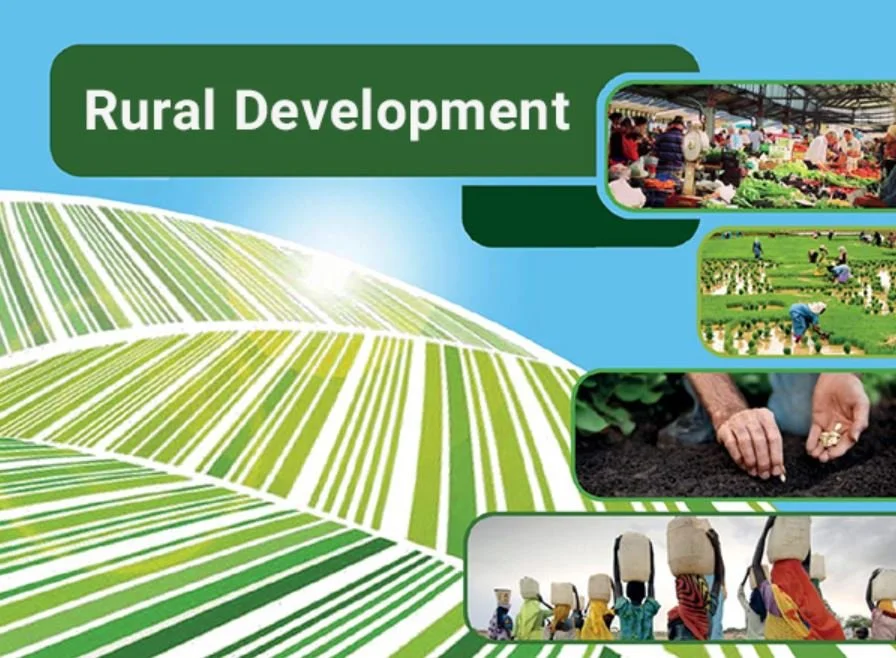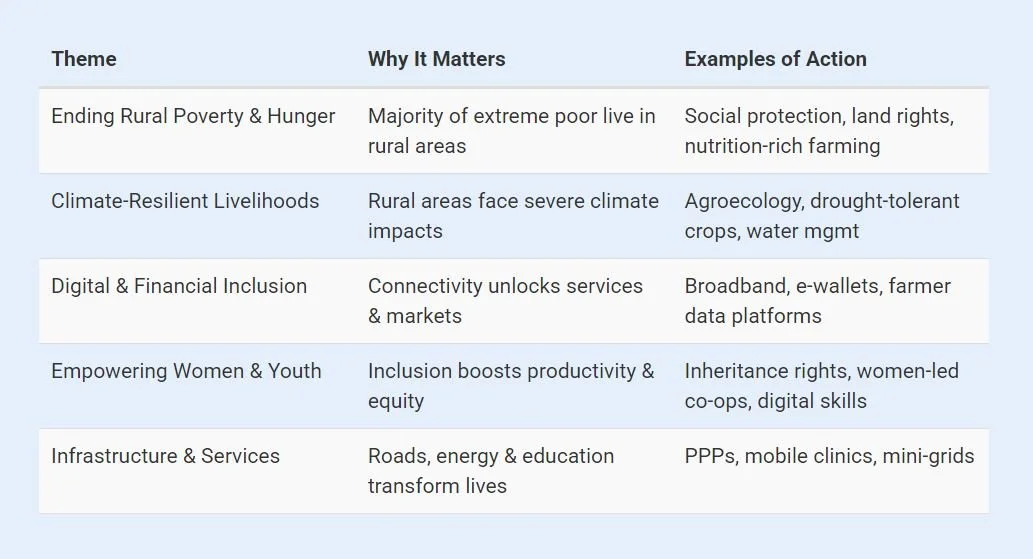PURPOSE: The United Nations General Assembly have established Resolution A/RES/78/326 declared July 6th as World Rural Development Day on 6 September 2024, reaffirming its unwavering commitment to the 2030 Agenda for Sustainable Development. This declaration, steeped in the spirit of international solidarity, acknowledges the deep-rooted challenge of rural poverty and the necessity of addressing it as a precondition for achieving the broader goals of economic, social, and environmental sustainability. Drawing from a lineage of global declarations and resolutions—from the Universal Declaration of Human Rights to the Addis Ababa Action Agenda—the resolution seeks to shine a sustained light on the lives and struggles of those who till the soil, harvest the seas, and nurture the land in rural corners of the world. At its heart, the resolution confronts the disproportionate burden of poverty, hunger, and exclusion borne by rural communities—especially by women, Indigenous Peoples, and youth—whose resilience is too often overlooked. It emphasizes the vital roles these groups play in agricultural development, food security, and ecological stewardship, calling for their empowerment through access to land, decent work, and inclusion in decision-making. By endorsing an integrated approach to rural development that embraces traditional knowledge, gender equity, and digital inclusion, the resolution envisions a future in which rural prosperity is no longer an elusive ideal, but a shared global achievement.
FORUM: ’’Rural Empowerment - Global Impact.’’ World Rural Development Day 2025. Rural development isn’t just about geography—it's about poverty, equity, food security and sustainability. Rural Development matters because according to the UNDP, 80 % of the world’s poorest people live in rural areas, earning less than $2.15/day. Close to 1 billion + people face acute multidimensional poverty—over half are children. According to the UN DESA,Half of rural populations lack health coverage (vs 22 % in urban areas). Family farms produce 80 % of the world’s food (FAO). Women make up 43 % of the agricultural workforce yet face barriers to land, credit & tech. Rural areas sit on the climate front line, enduring droughts, floods and extreme heat. According to the ITU; In 2024, 83 % of urban residents used the internet versus <50 % in rural areas. These challenges demand investment so that no one is left behind. With fewer than five years remaining to realize the vision of the Sustainable Development Goals, the path ahead remains uncertain and fraught with fragility. In this narrowing window of opportunity, World Rural Development Day emerges as more than a date on the calendar—it is a global reckoning, a solemn pause to reflect and reorient. It calls upon the international community to ensure that rural communities, so often overlooked and underserved, are not merely remembered, but placed firmly at the center of sustainable progress. The FAO Rural Institutions, Services and Empowerment (RISE) Team contributes to strengthen rural institutions and organizations. FAO supports integrated approaches for rural development, including a territorial approach. These combine rural development policy with other related areas, such as agriculture, social protection, economic inclusion, and climate adaptation, with the goal of improving family farms’ profitability and livelihoods in rural areas. The United Nations General Assembly underscores that investing in key facilities and services in rural areas will be an effective approach to address rural poverty and hunger, create productive employment and enterprises, and promote digital financial inclusion for rural communities and rural institutions such as community-based organizations and cooperatives, particularly for rural youth and women, including through regional and national initiatives.
EVENTS: On July 6th at the United Nations Headquarters, the United Nations Department of Economic and Social Affairs (UNDESA), the United Nations Economic and Social Council (ECOSOC) in cooperation with Governments, relevant international and regional organizations, the specialized agencies and all other stakeholders, will host a high-level event to mark the World Rural Development Day 2025; The observance of the Day, as outlined, is not intended as a mere ceremonial gesture, but as a catalyst for meaningful action. The organizers will promote rural development and raise awareness of the contribution of rural development in achieving the Sustainable Development Goals. Register to participate!
INITIATIVES: The needs and challenges faced by rural youth and the potential to expand the economic opportunities open to them will also be on the agenda. Discussions will focus on policy options to support the development of rural communities and improve resilience of family farms to economic, climate and other shocks. Under its Regional Initiative on empowering smallholders, family farms and youth through inclusive rural transformation, digitalization and innovation, FAO has implemented projects in Albania, Armenia, Azerbaijan, Belarus, Bosnia and Herzegovina, Georgia, Kazakhstan, Kyrgyzstan, North Macedonia, Republic of Moldova and Serbia. The findings of the project were presented in the Empowering smallholders and family farming series, which recognizes the need for an integrated and multidisciplinary approach for rural areas.
PUBLICATION: Guidelines on defining rural areas and compiling indicators for development policy.
STATEMENT: “Rural development is cross-sectoral. To ensure the maximum impact for smallholders and family farms and to achieve the Sustainable Development Goals, we must work in a comprehensive manner,” says Hartvigsen.
PODCASTS: Shaping and supporting rural development policies globally by providing policy support, technical expertise, and fostering collaboration among governments, non-governmental organizations, and the private sector. Listen to the audio-podcast!
CAMPAIGN MATERIALS: Strategies for agricultural and rural development require situational analyses and needs assessments. Get the communication materials!
WHY WE CELEBRATE THE DAY?
HOW TO GET INVOLVED!
PARTNERSHIPS
The United Nations Vision for Rural Development
Aligns with the 2030 Agenda and Addis Ababa Action Agenda.
Calls for an integrated economic, social & environmental approach.
Puts women & youth empowerment—especially land rights—front and centre.
Promotes multi-stakeholder partnerships and knowledge exchange.
Encourages a voluntary funding model for observance activities.
Governments are encouraged to develop rural data dashboards and allocate resources for essential infrastructure, helping to close development gaps in remote areas.
UN agencies and development banks may support the effort by hosting forums that explore financing solutions and inclusive land governance strategies.
Civil society organizations and farmers’ groups can contribute by organizing community field events, awareness campaigns, and discussions that bring rural perspectives into policy conversations.
Universities have a key role in offering lectures, youth-led challenges, and innovation labs that explore practical solutions to rural development challenges.
The private sector can play a vital part by introducing inclusive business models and establishing investment funds that support rural entrepreneurs and enterprises.
The United Nations Department of Economic and Social Affairs (UNDESA), the United Nations Economic and Social Council (ECOSOC) will help coordinate global outreach and highlight success stories that demonstrate the power and potential of rural transformation.


